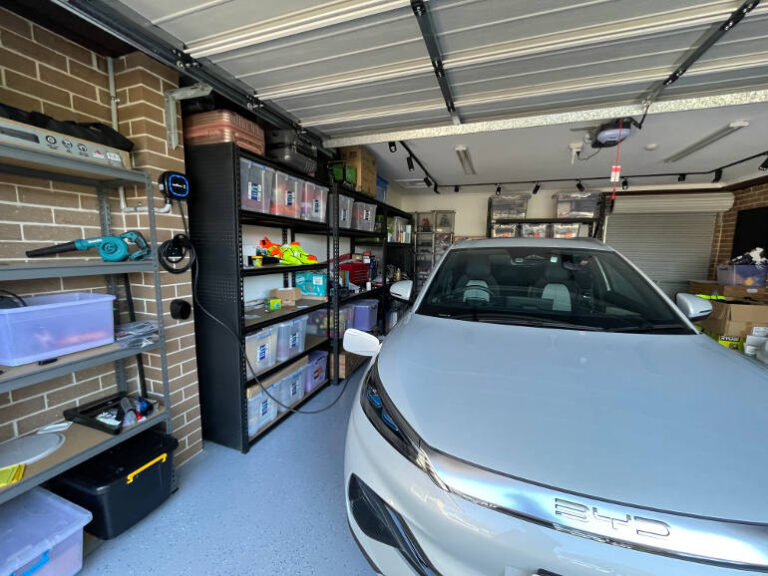Solar Juice provides complete solar systems, including solar panels, inverters, battery storage, and EV chargers. Recently, they onboarded Wallbox, a company that offers a range of energy management solutions, to provide their customers with a comprehensive suite of technologies and services.
Achilles, an end-customer, had ordered a BYD Atto3 electric SUV and reached out to Solar Juice to find the most efficient way to recharge his new EV. Tim, a licensed electrician from Sunchase Solar (Sydney), was assigned to install the charging infrastructure at Achilles’ place. The challenge was to design an efficient EV charging solution that leveraged the solar power generated by the home’s PV panels and minimised the use of grid energy.
Solution
To provide an efficient EV charging solution for Achilles, Solar Juice and Wallbox recommended the following setup:
- Solar Panels: 52 x Risen 390W
- Sungrow hybrid inverter 10kW 1P
- Sungrow 2 x SH5.0RS
- Sungrow battery 40kWh
- Wallbox Pulsar Plus 7.4 kW
- myWallbox app
- 1x Single Phase Clamp
- Power Meter
The Sungrow hybrid inverter and battery were installed to store excess solar energy generated during the day and use it for EV charging at night. Meanwhile, the Wallbox Pulsar Plus 7.4 kW was chosen because of its advanced smart features, controlled by myWallbox app, such as Eco-Smart (solar panel compatibility), Power-Boost (Load balancing), that enable efficient and sustainable EV charging.
With the myWallbox app, Achilles is able to monitor his EV charging status, set charging schedules, and select charging modes. The Eco-Smart feature allows EV charging with green energy generated from the solar panels at no additional cost while the Full-Green mode ensures that every charge is 100% green by detecting when there is enough surplus green energy available to power the car. Finally, the Eco mode mixes surplus green energy with grid energy to ensure a fast and efficient charge while minimizing the use of grid energy.
Results
The Solar Juice and Wallbox EV charging solution provided Achilles with an efficient and sustainable way to charge his new EV. By utilising the solar power generated by the home’s PV panels and minimising the use of grid energy, Achilles was able to make some seriously impressive savings.
The system was designed to calculate the electricity consumption of the BYD EV car and the electricity price during specific hours. The outcome revealed that the average electricity consumption of the BYD EV car was 13.3 kWh per 100 km, and the electricity price during 18:00 and 7:00 was 30 cents per kWh. With this knowledge, Solar Juice calculated the savings that Achilles could drive a total distance per year was 20,310 km per year with an electricity cost of just $810.
In comparison to his original petrol car, a Nissan Pathfinder 2015, it was found Achilles will save an incredible $4,884 per year thanks to the entire solar system and EV charger. And Achilles couldn’t be happier — especially as he was able to take advantage of the NSW Government initiative that covered more than the cost of the charger and the installation.
“I was very impressed to see the outcome, Full green mode actually works and the Wallbox is adjusting the EV charging current so that the house doesn’t withdraw any excessive power from the grid.”






